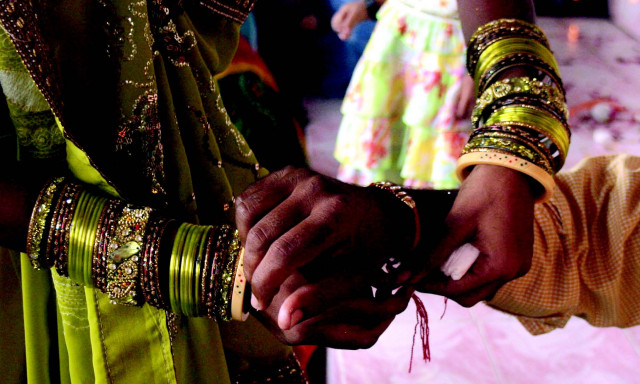It’s [k]not love for a day, but a lifetime
Thousands of Hindus in Karachi meet at the Laxmi Narayan Mandir every year.

It’s [k]not love for a day, but a lifetime
Thousands of Hindus in Karachi meet at the Laxmi Narayan Mandir every year. The mandir is the hub of Raksha Bandhan celebrations in the city. Around 1,000 to 1,500 Hindus also visit this mandir in the evening after 4 pm for more celebrations but a larger number comes during the day.
Relationships are the essence of any festival in Hindus and the same holds true for Raksha Bandhan, also called as Rakhi Purnima, which is the day to celebrate the bond of love between a brother and a sister. It is observed on the full moon day of the Hindu month of Shravanthe, when sisters tie a ‘holy’ thread on their brothers’ right wrist for their protection, success and prosperity. The brothers in return give presents to the sisters and vow to protect and care for them as long as they live. The day has its origins from the Aryan’s Indus Civilisation around 6,000 years ago.
Kajal, who was also at the mandir to tie the thread to her brother’s wrist, said she doesn’t want anything in return, “Uska pyaar hee bohat hai.”
Kajal’s mother said her son was born after a gap of 11 years. “It was because of his sisters’ prayers that he was born,” she said. Before he was born, the two young women would tie a thread on the statue of their god Krishan. “As a gesture of thanks, they still tie the raksha bandhan on Krishan and then on their brother’s hand,” the mother added.
The ritual, mostly observed in homes, starts with pooja at the mandir. “They say that any mannat made today never goes unanswered,” said a woman who had brought milk as an offering to the gods. She said that some people bring oil, cooked rice or mithai when their prayers are answered.
The whole family comes to the mandir after dressing up and recites bhajans in chorus with the rest of the community. After that they all prepare their thalis of pooja for the mighty sea, which consists of an oil lamp, fruits, and rice along with a coconut, which is thrown into the water as a mark of respect and offering to the gods.
According to the manager of the Swami Narayan Mandir at MA Jinnah Road, Mohan Thaal is the special sweet for the day that is made with coconut, dry fruits and desi ghee.
As they distributed Prasad in the form of dates and cooked sweet rice and had the special dish vermicelli kheer, they were also preparing vegetable biryani, and many other vegetable dishes for the communal feast.
After the pooja and a good meal together they go back to their homes where the sisters wait for their brothers to return home from work.
“We are very happy here, we celebrate the festival with full liberty,” said Parveen, clad in a green Banarasi sari. For her, it was a double celebration since she tied a raksha knot around her brother’s wrist while her sons were similarly blessed when her daughter tied knots around their wrists.
“We brothers are very clever, we don’t give them [sisters] a chance to bargain for a better gift because we don’t give them anything till the knot has been tied and we’ve been given our mouthful of sweets,” said Kumar. He has two sisters and this year he has brought an Indian sari for the married one and an unstitched dress for the unmarried sister.
Priyanka, who was carrying a beaded raksha bandhan, was excited because she had selected the ‘most beautiful thread’ for her elder brother. She was expecting Rs200 in cash as a gift.
Published in The Express Tribune, August 25th, 2010.



















COMMENTS
Comments are moderated and generally will be posted if they are on-topic and not abusive.
For more information, please see our Comments FAQ